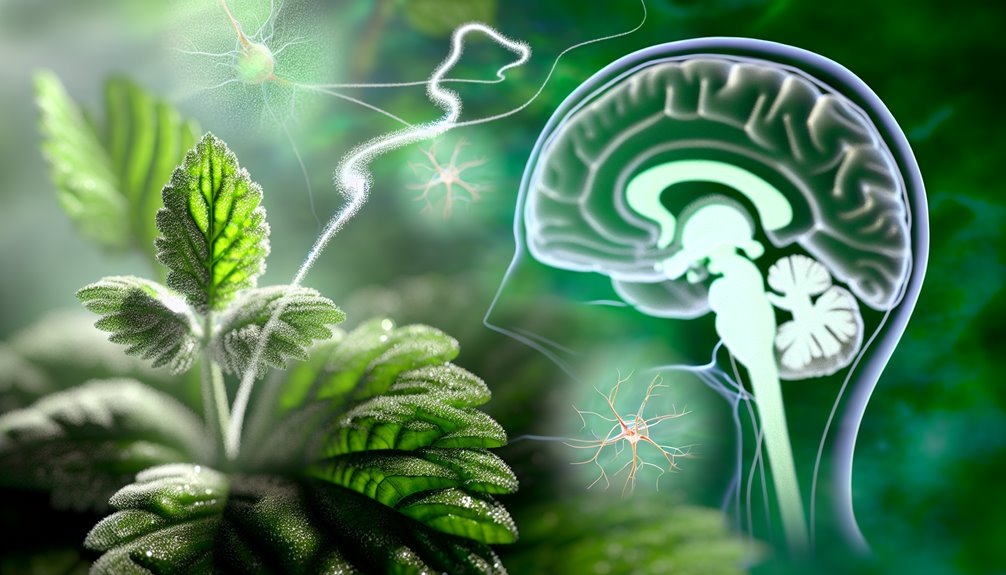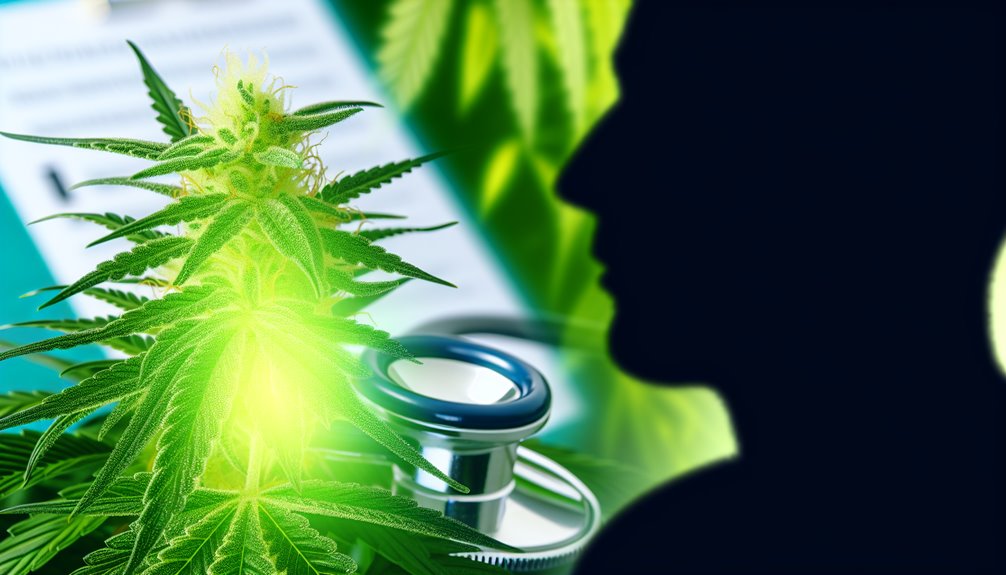You've likely heard about the potential benefits of cannabis for various health conditions, but have you considered its role in neurological disorders? The science is fascinating: it all hinges on cannabinoids like THC and CBD interacting with our endocannabinoid system — a regulator of many bodily functions. Studies suggest these interactions can influence neurotransmitter transmission, potentially alleviating symptoms of conditions like epilepsy, Parkinson's, and multiple sclerosis. But how effective are these cannabis-based therapies, really? And what about the ideal dosages and safety profiles? Let's dig deeper into this intriguing topic.
Understanding the Basics: Cannabis and the Human Brain

While you may associate cannabis primarily with its psychoactive effects, it is essential to understand how it interacts with your brain at a fundamental level. The active ingredient in cannabis, THC, activates cannabis receptors in the brain, disrupting the normal actions of endocannabinoids. This activation affects GABAergic interneurons, astrocytes, and the release of hippocampal glutamate, which are significant brain neurotransmitters. The disruption can impair connectivity of neuronal networks and overall brain functionality. In addition, THC impacts the transmission of other neurotransmitters such as acetylcholine, adenosine, and serotonin. Importantly, THC activation of CB1 receptors on mitochondria leads to decreased cellular respiration and ATP supply. This interaction at the microscopic level can have a profound effect on cognitive functions and brain development. Moreover, the endocannabinoid system, which THC interacts with, plays a significant role in regulating neurotransmitter release and synaptic plasticity, adding another layer of complexity to the effects of cannabis on the brain.
The Role of Cannabinoids in Neurological Health
Delving into the domain of cannabinoids and their impact on neurological health, it's important to highlight the extensive influence these compounds have on our brain. Cannabinoids, especially THC, activate cannabinoid receptors disrupting normal brain functioning. Prolonged exposure to THC impairs memory and learning, particularly during pivotal periods like adolescence. Furthermore, cannabinoids regulate vital cerebral processes including neuroinflammation. THC exposure can disrupt these processes, leading to long-term neurological outcomes. Chronic cannabis use is linked to an increased risk of cerebrovascular diseases and neurological disorders. While cannabinoids have a significant role in our neurological health, the potential risks make it essential to approach their use with caution. To serve others effectively, understanding the complex relationship between cannabinoids and neurological health is paramount. Recent research also points out the potential interaction between marijuana and prescription medications, especially in older individuals, further complicating the understanding of its effects.
Medical Cannabis and Multiple Sclerosis: What Does the Research Say?

If you're seeking evidence on the effectiveness of medical cannabis for treating multiple sclerosis (MS), there's a wealth of research to reflect upon. Studies show cannabinoids, like THC and CBD, interact with the body's endocannabinoid system, helping in pain management and reducing inflammation. Significantly, the MUSEC trial demonstrated cannabis efficacy in treating muscle stiffness, while the CAMS study reported improved spasticity, pain, and sleep disturbances. However, these benefits often don't last after treatment ends. Medicinal cannabis is generally well-tolerated with predictable side effects, but it's important to mention it doesn't slow MS progression. While the research presents a promising role for cannabis in managing MS symptoms, it's just one piece of a complex therapeutic puzzle.
Cannabis and Epilepsy: A Closer Look at the Evidence
Despite common misconceptions, cannabis, specifically Cannabidiol (CBD), plays a significant role in reducing seizures, particularly in treatment-resistant forms of pediatric epilepsy. CBD mechanisms disrupt the function of Lysophosphatidylinositol (LPI), a molecule that intensifies nerve signals and can provoke seizures. Importantly, upcoming NHS clinical trials will further evaluate CBD's efficacy in seizure management. Yet, there are efficacy challenges. Mixed outcomes in clinical studies, coupled with variable results, underscore the complexity of epilepsy treatment and the need for more extensive research. CBD isn't a one-size-fits-all solution. It's essential to understand that while CBD can offer hope for treatment resistance, its effectiveness varies. Hence, we must continue to explore, with empathy and diligence, the vast potential of cannabis in neurological disorders.
The Potential of Cannabis in Alzheimer's Treatment

While many might see cannabis as a controversial treatment option, it's important to contemplate the potential it holds in improving the lives of Alzheimer's patients. Clinical trials have shown the effectiveness of dronabinol, a synthetic form of THC, in reducing agitation, a common symptom of Alzheimer's.
Consider these points:
- Dronabinol reduced agitation in Alzheimer's patients by an average of 30%.
- It also stands as a safer alternative to traditional antipsychotics, with fewer adverse effects.
- The potential of cannabis isn't just limited to agitation reduction. It may also alleviate other symptoms such as behavioral disturbances and pain.
Your commitment to serving others might mean exploring these unconventional but promising treatments, and advocating for more research in this area.
Examining the Impact of Cannabis on Parkinson's Disease
Delving into the impact of cannabis on Parkinson's disease, we encounter a complex narrative. The cannabinoid mechanisms, specifically the interaction with CB1 and CB2 receptors, suggest potential neuroprotective properties. This interaction could be essential to motor symptom relief, as seen in laboratory animal studies. However, clinical trial limitations, significantly their small scale and inconclusive results, make it difficult to draw any firm conclusions. Patient surveys, though lacking control groups, hint at benefits for non-motor symptoms such as sleep difficulties and anxiety. While the evidence for cannabis's impact on Parkinson's is promising, it's still a puzzle with missing pieces. More extensive, large-scale trials are vital to fully understand its potential and limitations.
The Controversies and Challenges Surrounding Cannabis Therapy

Steering through the landscape of cannabis therapy, you encounter a multitude of controversies and challenges. From regulatory hurdles that impede research and muddy legislation, to gaps in physician education that challenge patient safety, the path to effective cannabis therapy is fraught.
- Regulatory ambiguities create confusion, with federal law contradicting state-level legalization.
- You're faced with ethical dilemmas as a healthcare provider, resulting from insufficient knowledge about cannabis dosing, effects, and long-term consequences.
- Commercialization risks loom, with potential for overuse and illegal trading due to profit motives.
Informed consent becomes a challenge, as patients need full understanding of the risks and benefits. Your commitment to serving others calls for maneuvering through these challenges responsibly, with patient safety and welfare at the forefront.
Future Perspectives: Ongoing Research on Cannabis and Neurological Disorders
Steering through the complexities of cannabis therapy, you've confronted numerous controversies and challenges. Now, let's turn our attention to the future. Ongoing research is working to elucidate the cognitive effects of cannabis use, with large-scale studies indicating reduced brain activity during working memory tasks in heavy users. Intriguingly, abstinence could improve performance, but it's not a one-size-fits-all solution. Researchers are also investigating cannabis use in young adults at risk of psychosis, focusing on how it may exacerbate reduced brain connectivity. While cannabis is linked to cerebrovascular diseases and various neurological complications, we still need to understand the exact toxicological mechanisms involved. Despite regulatory challenges, the science behind cannabis and its effects on neurological disorders continues to evolve, offering hope for more effective treatments in the future.
Conclusion
You've explored the science behind cannabis and neurological disorders. You've seen how cannabinoids may offer relief for multiple sclerosis and epilepsy, glimpsed their potential in Alzheimer's treatment, and scrutinized their impact on Parkinson's disease. Despite the controversies and challenges, the future of cannabis research holds promise. As you continue to investigate this evolving field, remember to weigh evidence carefully, scrutinize details, and remain open to new perspectives.
If you're curious to learn more about how cannabis might help with neurological disorders or if you have specific questions, I warmly invite you to visit Fells Point Cannabis Docs of Maryland. Our team is here to provide you with information and guidance tailored to your needs. You can also give us a call at (410) 401-4200. We'd love to chat and help you explore the possibilities!
